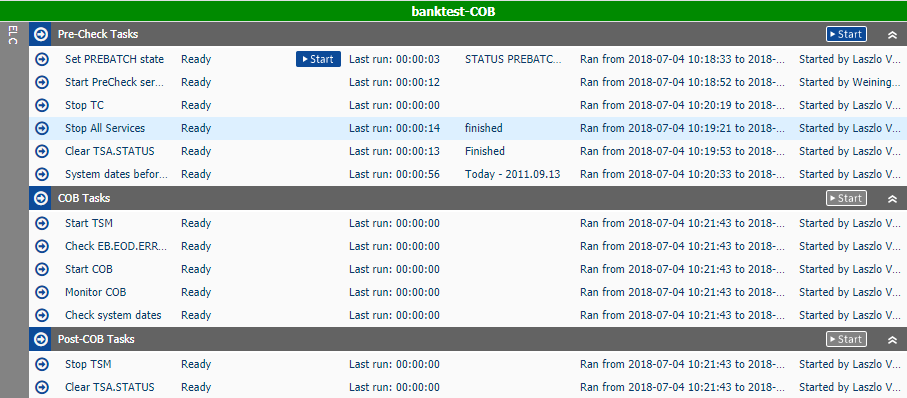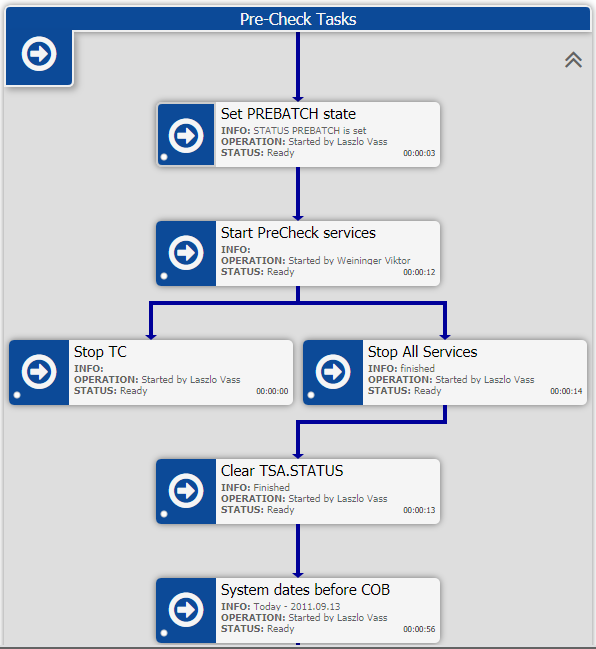Where is core banking job scheduling headed?
Job scheduling in core banking environments is not simply about the (obvious) task of scheduling jobs. In fact, it can enhance banking IT operation processes from several aspects. Its greatest benefits include the prevention of manual errors, improved job organisation thanks to defining a fix job catalogue and order, plannable process runtimes, and automatic job runtime and performance statistics.
Benefits of a job scheduling tool
1. Job transparency
Core banking processes are complex, especially if your bank offers various specialised, customisable services to its clients. A good job scheduling tool can be of immense help regarding job transparency, since it allows you to organise the jobs underlying any process into groups, thereby offering a comprehensive and organised view of what is happening in the system.

2. Systems synch
The right job scheduling tool supports you in harmonizing different systems by allowing you to set a defined job order complete with dependencies. This is also boosted by the visualisation of jobs as a timeline.

3. Plannable process runtimes
Process runtime fluctuation should not be affecting your service levels. With the right scheduling tool, you can keep track of runtimes both for the day and statistically, so you know when your operator needs to take matters into hand.
This is a fairly simple, but all the more useful concept. The tool logs the runtime of all automated jobs individually each day and compiles historical statistics for each. The values are then used for creating runtime estimates. These, in turn can serve as the basis of alerts for processes that run for longer than customary. Intelligent scheduling solutions will also allow for configuring hard days with a different set of runtime estimates.

4. Elimination of manual scheduling errors
Different jobs might have different requirements regarding when they can be run. For instance, some run weekly, be started daily. This, of course, might cause complications if job scheduling is performed manually, since human intervention always carries a possibility of error. A properly configured job scheduler eliminates this problem, since it will unfailingly know when to run or skip specific tasks – and never forgets to do so.
Today’s job scheduling tools can be configured just like any good digital calendar. For instance, you can set a certain process to be run on the second Friday of each month – and it will run accordingly. With the exception of public holidays, of course. Not a creature (not even a mouse) will stir on public holidays.

5. Error escalation
The bad news is job schedulers might not be able to handle a variety of errors in the processes. The good news is most of them can escalate problems to the IT operator in compliance with a pre-defined escalation protocol. This supports timely problem solving – the operator will definitely know if there is an error.
The future of job scheduling
While a good number of intelligent job schedulers (such as the Enterprise Level Scheduler included in our GAMMA banking IT operation tool) are capable of meeting the challenges described above, there are still room territories to conquer in job scheduling. We would like to underline two that have the power to make process management a significantly smoother experience.
Error handling/fault tolerance
Using an intelligent job scheduling solution, IT operators can be relieved of having to deal with a number of errors. With the help of machine learning, an intelligent scheduler can be taught various decision-making protocols. For this purpose, the tool must be able to analyse the log file created by the specific task. Based on the type of job and the type of error logged, the protocol could provide a simple resolution to the error or other actions. These includes stopping the system and escalating the issue to an operator (together with a log of similar issues previously encountered and the actions performed to tackle them, even), moving on to the next task, switching to an alternative process, and so on.
And speaking of logging: the optimal scheduler will also log the errors and compile error reports at given intervals. Intelligent error handling, therefore, decreases the workload on IT operators, accelerates error resolution, and (consequently) improves service and reporting time and efficiency.
System analysis
Job schedulers will also play an important role in determining exactly when and what happens in your system in terms of correlations between processes and system performance. I.e. an advanced job scheduler tool will let you know exactly which job was running when (for instance) CPU usage was too high.
It is, however, not enough to simply automate jobs. It is crucial to constantly monitor and analyse running times, along with system resources, performance and component availability. This allows us to connect possible errors and degradations with specific processes. In the future, these interventions can be automated and improved through machine learning.
What do you think? Would your organisation benefit from these future possibilities? What feature would you like to see in a job scheduler? Comment below!
